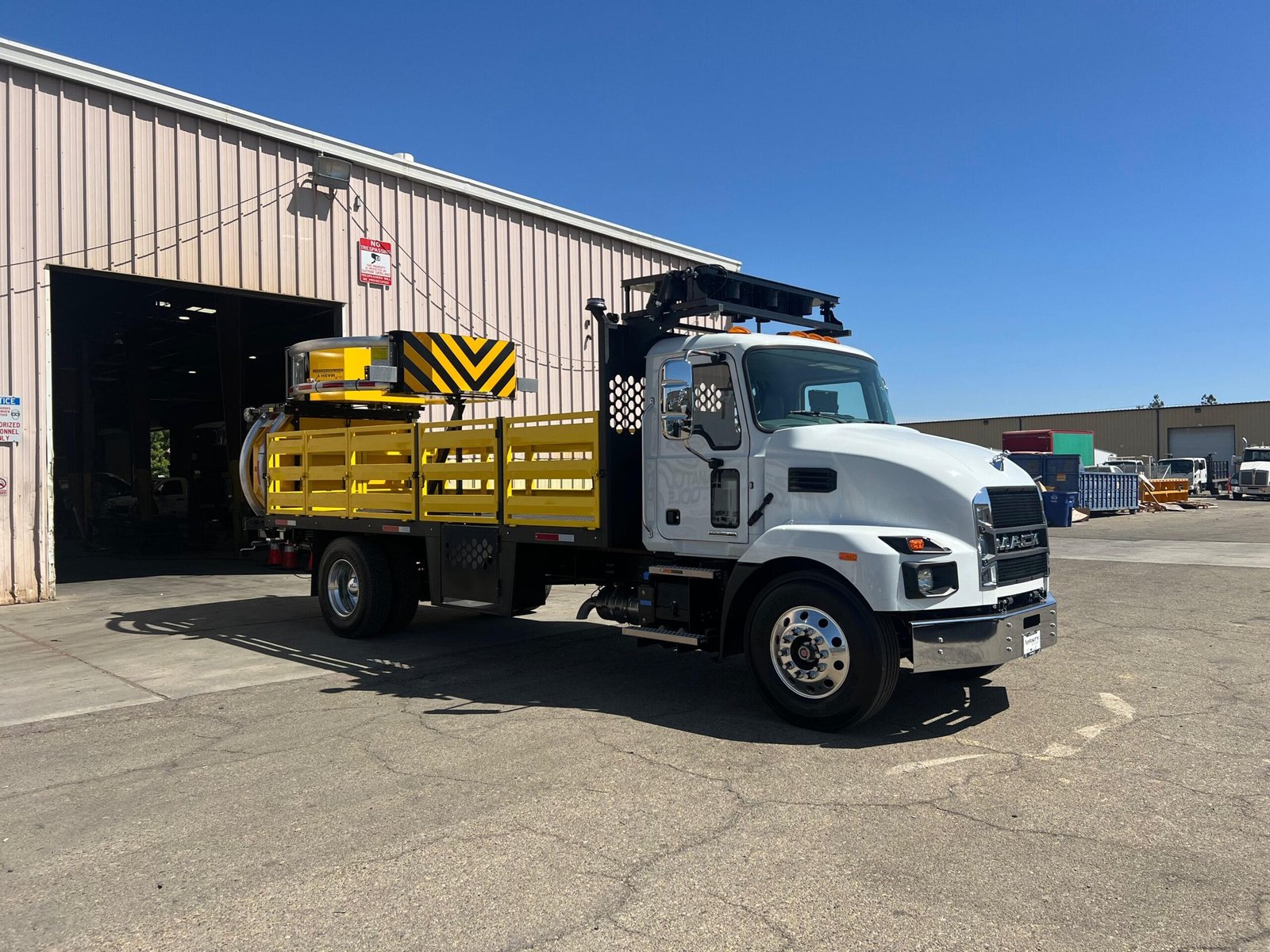Traffic safety is a top priority for any construction zone, and Truck-Mounted Attenuators (TMAs) are crucial for protecting workers and motorists alike. Just like any other vehicle or piece of equipment, TMA trucks need regular maintenance to ensure they function safely and efficiently. At Western Highways Traffic Safety, we understand the importance of keeping your TMA trucks in top shape. In this article, we’ll explain how often you should service your TMA trucks and the key maintenance tasks that help extend their lifespan and ensure they perform reliably when needed most.

1. Why Regular Service Is Essential for TMA Trucks
TMAs are essential for work zone protection, so keeping them in peak working condition is a matter of safety. Regular service not only ensures the truck is operating safely but also minimizes downtime and costly repairs.
- Why It Matters: TMAs often operate in challenging environments, dealing with heavy use, extreme weather conditions, and constant movement. Regular servicing helps avoid breakdowns that could endanger workers or cause delays.
- How It Helps: By staying on top of maintenance, you can ensure that your TMA truck is ready to go when you need it, keeping your operations running smoothly and avoiding unexpected repair costs.
2. Factors That Affect How Often You Should Service Your TMA Truck
The frequency of servicing your TMA truck depends on a number of factors, including the age of the truck, the mileage, the type of work it’s doing, and the conditions it’s operating in.
- Why It Matters: These factors can affect the wear and tear on the truck, which in turn impacts how frequently it needs servicing.
- How It Helps: Understanding these factors will help you determine the optimal maintenance schedule for your TMA trucks, ensuring that they stay in top condition for as long as possible.
3. Service Intervals Based on Usage
For most TMA trucks, regular service should occur every 6 to 12 months depending on usage. For trucks that are heavily used, such as those operating in high-traffic or extreme conditions, more frequent inspections may be necessary.
- Why It Matters: Regular inspections ensure that issues are caught early before they turn into bigger, more expensive problems.
- How It Helps: Routine servicing at the recommended intervals helps keep your truck functioning at its best, ensuring it is always ready to perform its critical role in protecting workers and motorists.
4. Key Maintenance Tasks for TMA Trucks
Servicing your TMA truck involves a series of important checks and maintenance tasks. These tasks ensure that the truck remains operational and compliant with safety regulations.
- Why It Matters: Proper maintenance extends the lifespan of your truck, improves performance, and ensures that all safety features are working properly.
- How It Helps: Regular maintenance can include tasks such as:
- Brake inspection and adjustment: To ensure that the braking system is fully functional and responsive.
- TMA calibration and inspection: To ensure the TMA is properly aligned and functioning as it should.
- Fluid checks: Checking oil, coolant, and hydraulic fluids to prevent overheating and ensure smooth operation.
- Tire inspections: Ensuring the tires are properly inflated and have enough tread for safe operation.
- Battery and electrical system checks: Ensuring the battery is functioning and the electrical system is intact to avoid electrical failures.
By maintaining these key components, you can extend the life of your TMA truck and ensure that it operates smoothly and safely.
5. Seasonal Maintenance Considerations
Seasonal changes can also impact your TMA truck’s performance. For example, trucks used in colder climates may need additional servicing before winter to ensure that the engine, battery, and other components are protected from extreme cold.
- Why It Matters: Different weather conditions can affect how your truck operates, with colder temperatures, snow, and ice causing additional wear on specific components.
- How It Helps: Seasonal servicing helps you prepare your truck for the specific challenges each season presents, keeping it running smoothly throughout the year.
6. Signs That Your TMA Truck Needs Immediate Service
While regular maintenance is important, it’s also crucial to be aware of any signs that your TMA truck needs immediate attention. Common indicators include:
- Unusual noises (e.g., grinding, squealing, or clicking sounds)
- Difficulty starting or stalling
- Decreased braking performance
- Fluid leaks
- Warning lights on the dashboard
- Why It Matters: Ignoring these signs can lead to breakdowns, costly repairs, and safety issues on the job site.
- How It Helps: If you notice any of these symptoms, it’s important to schedule a service immediately to prevent further damage and keep the truck operating safely.
7. Professional TMA Truck Servicing
While regular inspections and basic maintenance can be done in-house, professional servicing is often required for more in-depth checks. Western Highways Traffic Safety offers comprehensive TMA truck servicing, ensuring that your vehicle meets safety standards and performs at its best.
- Why It Matters: Professional technicians have the experience and tools to handle complex maintenance tasks, ensuring that your TMA truck stays in top working order.
- How It Helps: Our expert team will perform detailed inspections and maintenance to identify any potential issues and keep your truck in optimal condition.
8. The Benefits of Regular TMA Truck Servicing
Servicing your TMA truck regularly offers several important benefits:
- Improved safety: Ensures the truck’s safety features, like the TMA, brakes, and lighting, are working properly to protect workers and drivers.
- Reduced downtime: Routine maintenance helps prevent unexpected breakdowns, keeping your truck on the job when you need it.
- Increased lifespan: Regular care ensures your truck lasts longer and continues to perform reliably.
- Cost savings: Proactive servicing reduces the need for expensive, unexpected repairs.
Conclusion
Regular servicing of your TMA trucks is essential for maintaining their safety, efficiency, and performance. At Western Highways Traffic Safety, we recommend servicing your TMA trucks every 6 to 12 months, with more frequent inspections if the truck is used heavily. By following a regular maintenance schedule and addressing issues early, you can ensure that your TMA trucks continue to perform at their best, keeping your work zone safe and efficient.
Contact Us
Need to service your TMA trucks or schedule a professional inspection? Contact Western Highways Traffic Safety today:
- Phone: +1 (559) 785-1400
- Email: info@westernhighwaystrafficsafety.com
- Website: westernhighwaystrafficsafety.com




